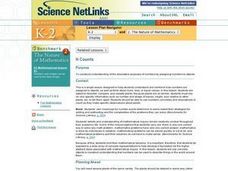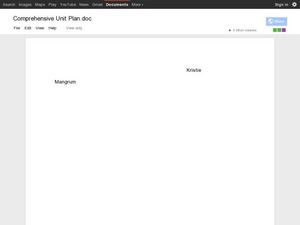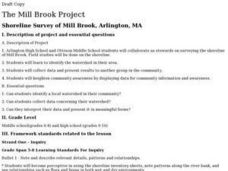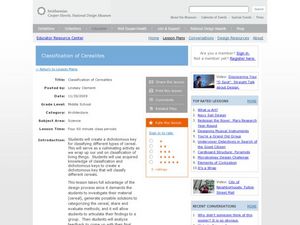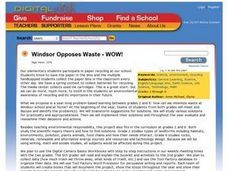Curated OER
It Counts
Learners classify and compare plants using specific information, observations, and numbers. In this mathematical inquiry lesson, students use plant characteristics to describe, compare, and classify them. They attempt to develop a system...
Curated OER
The Life Cycle of the Mealworm
Fourth graders provide a habitat for live mealworms and observe their life cycle. In this animal life cycle and scientific inquiry lesson, 4th graders create a habitat for a live mealworm and observe and record related data as it grows....
Curated OER
Numbers as Descriptors
Pupils use numbers as descriptors. In this mathematical inquiry lesson, students use numbers to describe, classify, and compare plants. Pupils are made aware that numbers can be used to describe things in the world around them.
Mascil Project
Water Quality
How do you prevent the spread of water-borne illness in large public swimming areas? Scholars discover the challenges to identifying safe water through an inquiry experiment. They then produce posters sharing their understanding of water...
Curated OER
Altering a Plant Environment
Students investigate what a controlled group is by creating an experiment. In this plant growth lesson, students identify the different parts of a plant and discuss what is needed for a plant to be successfully grown....
Curated OER
The Nature of Mathematics
Students work in groups to describe plants using numbers. In this number lesson, students use numbers to define plants and then use numbers to write descriptions of themselves.
Curated OER
Botanical Discoveries
Sixth graders examine the Lewis and Clark Expedition. In this plant discovery activity, 6th graders put in chronological order the plant discoveries of Lewis and Clark. Students understand the characteristics of leaves and find the area...
Curated OER
The Study of Urban and Suburban Environments within the Mystic River Watershed
High school students examine their own water-based environments, within the Mystic Watershed. As the learners engage in inquiry-based, hands-on projects, critical thinking skills and problem-solving, the project will lead them to cross...
Curated OER
Classification of Cerealites
Students create a dichotomous key. In this categorizing lesson, students create a dichotomous key for different types of cereal. Students classify the cereal into groups such as flakes and cereal with holes. Students discuss their...
Curated OER
Growing bacteria
Students investigate the growth of bacteria under the right condition. In this biology lesson plan, students observe the growth of bacteria and fungi given the perfect condition to grow. They graph the result and investigate where else...
Curated OER
Decomposing Artifacts
Seventh graders participate in an experiment in which they calculate the time of decomposition of different materials. In groups, they fill bags with different materials and cover them in soil. After six months, they create a line graph...
Curated OER
Prey or Pray? Could YOU Escape a Cheetah?
Tenth graders estimate the size of an adult cheetah by research and measurement of a picture. They determine the approximate distance and speed of the cheetah from a filmed chase and compare that to their own running speed.
Curated OER
Raquel's Radishes
Sixth graders develop a reasonable hypothesis for a fictional science fair investigation. 'Raquel' is going to grow radishes and test for the best way to nourish them. They create a bar graph and write conclusions.
Curated OER
Windsor Opposes Waste - WOW!
Learners participate in paper recycling. They are taught to environmental awareness of recycling and its importance in their future. Students discuss and identify the problems of how they can minimize waste. They brainstorm suggestions...
